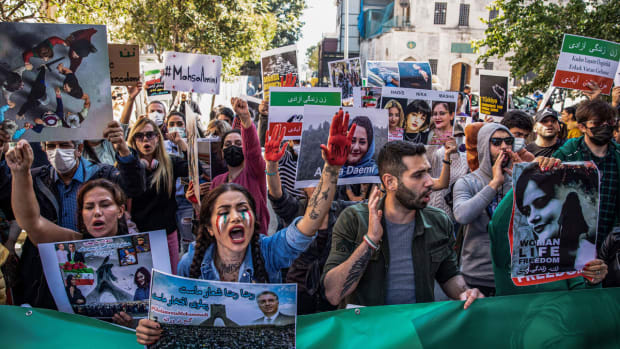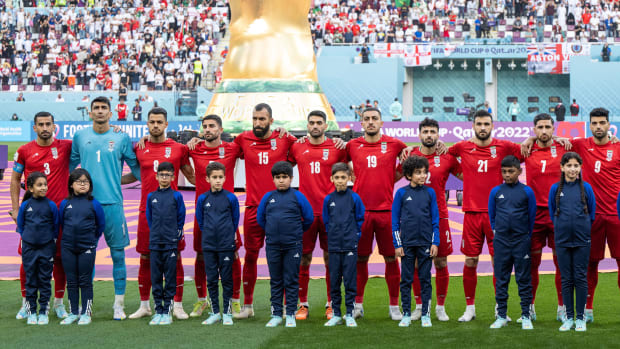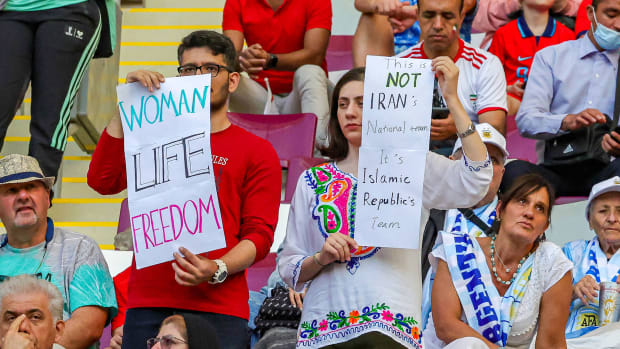As tensions flare at home, there are factions who don’t think Iran should be at the World Cup at all, but Team Melli is there, and its stance is being projected to a global audience.
DOHA, Qatar — When Iran first qualified for the World Cup almost half a century ago, Team Melli was led by a dogged defender from Tehran.
Consider Andranik Eskandarian the original Tenacious D. Through speed, work and sheer will, Eskandarian shadowed the best attacking stars of his era, shutting down everyone from Diego Maradona to Pelé to George Best. Eskandarian still recalls one game against Johan Cruyff, who ran to his coach at halftime and screamed, “Why did you send this animal after me?”
“All those big names, they hate my guts. Maradona couldn’t handle me,” Eskandarian recalls with a sly smile Monday afternoon, inside a coffee shop in the hotel where the U.S. national team is staying. He’s fresh off an overseas flight, having arrived just in time to watch the Americans play Wales in 10 hours. He’s thinking back 48 years, to the one time he played in Qatar, a country that has transformed over the past decade. For that game, Eskandarian cannot recall a single building higher than two stories, nor remember a street made from asphalt.
The Iran he knew back then, in 1978, at the time of the first World Cup appearance, had just begun to change. The Islamic Revolution started that January, six months before the soccer tournament, and its leaders pursued freedom and democracy. The national team, through which the vast majority of its citizens identified, was young but talented and deep. And fans starved for soccer success saw themselves in the soul of Eskandarian, who wasn’t fighting in the revolution but shared a spirit of resolve with those who were.
Team Melli made the tournament, which consisted of only 16 teams at that point, losing to the Netherlands and Peru, but fighting to a draw with Scotland in the match in between to secure the country’s first World Cup point. Eskandarian can still remember returning home to a joyous airport stuffed with supporters, where the players were carried like kings from the airplane to their bus.

Onur Dogman/ZUMA Wire/Imago Images
The Revolution, which wasn’t the same as soccer, of course, overthrew the Pahlavi dynasty in February of the next year. Eskandarian left for a professional soccer career in the United States, starred for the New York Cosmos, built a family, retired and opened Birkenmeier Sports Shop in Hackensack, N.J. He sold soccer gear and apparel to fans from all over the world, including a young Gregg Berhalter, now the U.S. national team coach. Eskandarian’s son, Alecko, would follow his father into professional football, as a player and a coach and now a development executive with Major League Soccer. But not before Berhalter and his older brother, Jay, babysat the son of Iranian soccer royalty.
Alecko’s father wasn’t simply a star. He was an Iranian star with Armenian blood, a Christian who reached beloved status in a predominantly Muslim country. Locals still send Alecko thousands of messages over Instagram every year on his father’s birthday.
All of which helps make sense of what the elder Eskandarian says about the current revolution in Iran, with all its murder, imprisonment and bloodshed. “I cannot comment,” he says. But he does feel for Iranians, for his friends and for his country and for the players who took to the field here against England on Monday afternoon. They are like him in 1978—and they’re not like him at all.
Eskandarian remembers a game he played in Paris, in 1977, after officials painted over graffiti that local protesters had sprayed onto the field, the words directed at the Pahlavi regime. The crowd spit on the Iranians as they jogged onto the pitch, and while the fluid hit him, the hatred, he says, did not. His dream was to play in the World Cup, and that game marked another step in the right direction.
He knows that now is different, not like then, much worse. On the flight over, he discussed the circumstances with his son. “We don’t know what they’re going through,” he says.
The implication is left hanging.
It’s impossible to even begin to imagine. Dream or not, how could anyone play soccer while their country remains locked in the throes of human atrocities and political unrest?
Iran’s national team arrived at Khalifa International Stadium on Monday for its sixth World Cup appearance. There were protests taking place across the street, complete with chants and demonstrations. FIFA and the Qatari government had already put a dent in the OneLove campaign started by the Netherlands, issuing an edict to the captains of seven European squads who planned to wear rainbow armbands inscribed with “OneLove.” If they followed through, FIFA decided they would receive yellow cards before their matches started.
“This is completely against the spirit of our sport, which unites millions of people,” the Dutch football association said in a statement it released. “Together with other countries involved we will critically look at our relation to FIFA.”
Inside the Khalifa International perimeter, there were drummers and fireworks and all manner of costumes, from painted faces to hair dyed like the flag of England. The air in there felt heavy, due to everything—the protests, both in Iran and in Doha; the helicopters whirling by overhead; the steady (and actual) drumbeat booming across the ground; and the laudable decision by England’s players to continue kneeling in an anti-racism gesture before the game started.
Many believed the Iranian players should not have taken the pitch at all—not least the Ukrainian FA and club Shakhtar Donetsk, who base their claims on Iran’s alleged support of Russia in the ongoing war. But the more prominent backdrop stemmed from the ongoing protests that began in late September, which were sparked by the death of Mahsa Amini, a young Iranian woman who was arrested by what they call the morality police in Iran. According to hundreds, if not thousands of reports, they arrested her, and, as they transmitted her to a detention facility to be processed, they savagely beat her. Amini fell into a coma and died a few days later.
Iranian protesters took to the streets immediately and haven’t stopped as their movement grew. They are led primarily by women and other marginalized populations, whether ethnic or religious minorities, the LGBTQ community, or anyone else fed up with the inequality that has defined life in Iran for decades.
Throughout that span, experts say, the people living in Iran have remained disconnected from the power of the larger international community; first, by war, then by sanctions that meant they couldn’t travel. And by the hostility the regime held toward the West. Conversely, the beautiful country that Eskandarian remembers was hardly seen by outsiders.
Social media, as it often does, changed that calculus, in small ways and larger ones. The majority of Iranians, according to reports, joined Instagram and began connecting with the wider world in recent years. Many younger citizens began to educate themselves while fortifying connections with activists in other places.

Joel Marklund/Bildbyran/Imago Images
The soccer players on the national team found themselves caught between the regime and the protesters. Most, if not all, sympathized with the movement. Many were publicly supportive. Because Team Melli is symbolic of the country, this emboldened some and enraged others. But any backing was grounded in human decency. It was for Iranian women who cannot enter soccer stadiums, for female Iranian soccer players who couldn’t choose what they wore while playing, for the women and children and others who were being assaulted, raped, thrown in jail and murdered, their bodies left dying in the streets. But the country’s football federation was also tied to the regime, by money and resources, if not much else. It seems like a stretch to connect the players by that alone, but many have, and many more will.
If there remained any doubt of which side those players stood for, they removed it before their game Monday afternoon. They didn’t sing the national anthem, because, ostensibly, they represented the people of their country, not the rulers, in a show of solidarity that was historic and took guts.
Thing is, none of this really started in September. The tension, fear, intimidation and grave consequences for Iranian athletes are long and well established.
Few understand this tricky and potentially deadly crucible better than Sardar Pashaei, an elite wrestler for his country’s national team who won a World Youth Wrestling gold medal in 1998 and hoped to compete in the Olympics, in what many call Iran’s national sport, before politics and activism derailed his promising career.
These days, Pashaei lives in Washington, D.C., and works for the sports-specific arm of the United for Navid campaign, which was founded by Masih Alinejad, an Iranian journalist and activist. Alinejad is also a close friend of Pashaei, who says the regime “tried to kidnap her, tried to kill her,” in America, “just a few months ago.” His account is verifiable, both from court documents and her interviews, in which she said a man arrived at her safe house in Brooklyn armed with an AK-47, only to be intercepted by the FBI.
Pashaei himself says he receives dozens of death threats, daily. Every time he tweets, he sees the responses. This is gonna cost you. We know your address. Your whole family will be executed. His sister was arrested last month, in a demonstration in Iran. Others, he says, have menaced his teenage niece. I ask what any empathetic human would. Would speaking for this story put his life in greater danger? Perhaps, he says, while declining to be quoted anonymously. “This is the least I can do for my people,” he says. “Nothing can stop me. I go to the media, to be the voice of those people, those athletes. Brave teenagers are still fighting for basic human dignity on the streets.”
He sends dozens of accounts of Iranian athletes being arrested: a national marksman, beaten by security for engaging in the protests; an elite bodybuilder, shot dead by security forces, his mother forced to bring his championship medals and place them on his grave; a footballer arrested for social media posts written in support of the movement … then another player for the same thing, from the same sport … then a third, Hossein Mahini, who played seven years for the national team, then Ali Daei, a longtime captain who once held the men’s record for international goals scored, with 109.
Pashaei sends a news account related to the head of Iran’s National Olympic Committee. It’s Mahmoud Khosravi Wafa, the former lead bodyguard for Ali Khamenei, the Supreme Leader of Iran. This is the same bodyguard/executive, Pashaei says, who works for a regime that threatens athletes and their families, that kills athletes, like the wrestler Navid Azadi—hence the name of the organization Pashaei works for—then tells their families they will not return the bodies, and, in some instance, that they cannot stage a funeral.
The campaign consists of roughly 30 Iranian athletes. They tell their stories to journalists, sports leagues and international governing bodies like FIFA. Some of the athletes still live in Iran and express their experiences anonymously, lest they end up like the others. Others, like Pashaei, bravely step forward, embracing the risks, which include being arrested, tortured, beaten, banned and killed. Iran, he says, even banned a female referee who was slated to make history in the women’s tournament next summer.
To that end, Pashaei and his band of athlete activists lobbied FIFA to ban Iran from this competition and any future ones until the unrest ends and policy changes. They told FIFA how their rulers had barred women from watching football. How a young woman had set herself on fire in protest. How others were pepper-sprayed at stadiums.
They hired a high-powered lawyer, Juan de Dios Crespo Pérez, who is based in Spain and specializes in sports, the EU and international law. He sent a letter to FIFA executives, including the organization’s president, Gianni Infantino, detailing all the horrific events and threatening third-party legal action should FIFA not ban Iran from international competitions the way that other countries have. It didn’t work. But Pashaei says that legal action will continue to proceed.

Nigel Keene/Pro Sports Images/Imago Images
Banning Iran wasn’t ever likely to succeed for this World Cup, says Alex Vatanka, the founding director of the Iran program at the Middle East Institute, who specializes in regional security affairs in the Middle East. “FIFA stays away from politics,” he says in a voice memo sent over WhatsApp. He also doesn’t see the ban as a unifying factor, meaning not every Iranian agrees that it should happen.
“There are those in the Iranian opposition who wanted Iran not to go,” he says, “and there are those who think politics and sport shouldn’t be mixed up.” He notes, also, that the U.S. government chose not to get involved.
Still, “even after the World Cup,” Pashaei says, “our goal is that, for as long Iran violates all manner of human rights, killing teenagers, raping women, it should be suspended from all international competitions.”
Pashaei watches what he calls the misdirection from afar, where sportswashing meets a movement at the World Cup and in other sports, in other places. He saw that FIFA asked Iran’s government to let women into games, but he believes that officials picked only female parliamentarians and their relatives. He also heard from sources on the ground that Iran announced that women could buy tickets online, but then added a “gender” response on the ticket form, to ensure that no women actually would.
This activist, a man who is from Iran, who wants to change the systems in his country, the place he starred for, before it banned him, was halfway across the world when the England-Iran match begin. The game was lopsided, a 6–2 victory for The Three Lions over Team Melli. Iran’s most notable moment beyond the goals came when its starting goalkeeper collided with his own teammate, resulting in a head injury and a trip off the pitch on a stretcher. It only went downhill from there.
Pashaei worried that the World Cup was distracting, well, the world from the movement. He worried about all the usual sentiments, about sports and their unifying power. He didn’t say this hesitantly, but it couldn’t have felt good to say, “Personally, I criticize these athletes. They did not do their jobs. Their responsibility was to be the voice of their people.” Perhaps they did do that, in their silence throughout the anthem. It’s hard to say.
“Sportswashing for blood, that’s what this is,” Pashaei says, and here, he means the government and its soccer federation. Not the players.
That said, Pashaei didn’t see his countrymen compete Monday. In protest, he didn’t watch.